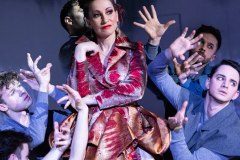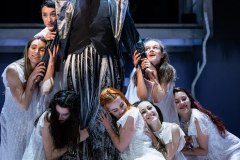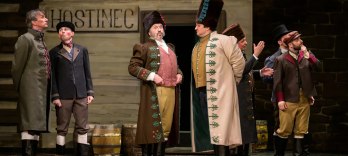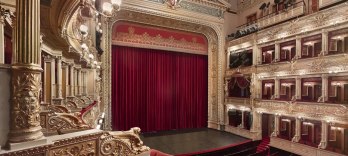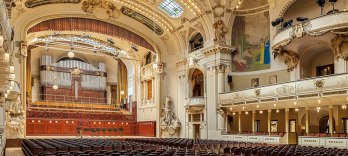Rusalka Opera
Mo | Tu | We | Th | Fr | Sa | Su |
The National Theatre in Prague has performed the piece ever since 1901, when it hosted its world premiere. Inspired by ancient fabulous motifs and legends, particularly by H. C. Andersen’s tale The Little Mermaid and K. J. Erben’s ballads from the collection The Bouquet, the librettist Jaroslav Kvapil created an enthralling poem of exceptional linguistic and intellectual qualities. His text served as a great basis for Antonín Dvořák, a master of melody and colourful instrumentation, who went on to conceive his finest opera. (Its popularity among Czech audiences can only be compared with that of Bedřich Smetana’s The Bartered Bride.) As in the case of other classic works, the genius of Kvapil and Dvořák’s Rusalka is enhanced by the copious options of its interpretation. Accordingly, it is up to the staging team to decide which of the mysterious themes and motifs to accentuate and which path to take.
The new National Theatre production of Rusalka has been entrusted to SKUTR, a directing tandem whose wildly popular adaptation of Erben’s The Bouquet has met with great critical kudos. The music has been undertaken by Tomáš Netopil, one of the internationally most sought-after Czech conductors.
The production will be presented within the celebrations of the Year of Czech Music 2024.
Synopsis
Act One
Wood nymphs gather by a lake. Their singing and dancing calls from the depths the Water Sprite, who watches and dallies with them. After the woodnymphs have scattered, the Water Sprite espies the dispirited water nymph Rusalka. He is duly appalled by her confession that she would like to become
a human and have a human soul, which, as she imagines, is full of love. Rusalka confides to the Water Sprite that a human frequently comes to have a swim in the lake. Yet she would have to become human in order for him to embrace her. Suspecting that Rusalka has surrendered to her desire, the
downhearted Water Sprite sends her to the Witch for help. Before Rusalka leaves to see the Witch, she asks the Moon to tell her beloved of her troth. She meets the Witch, in whose wisdom she trusts, and begs her for help. The Witch warns Rusalka that if she becomes human she will be struck dumb, and if she loses human love she will be damned and will have to return to the depths of the lake and kill her beloved. After Rusalka, believing in pure love, agrees to the terms, the Witch begins casting her spells. The morning forest resounds to the horns of hunters headed by the Prince, who finds himself by the lake. The Prince feels a strange tiredness and sends the others back to the castle so as to be alone. He is distracted from his reveries by Rusalka, who has transformed into a beautiful maiden. The Prince is enchanted by her. Although the mute Rusalka does not answer the Prince, he professes love to her and leads her to his castle.
Act Two
A wedding feast is being prepared at the Prince’s castle. The Gamekeeper and the Turnspit exchange their impressions of the strange girl the Prince has found in the forest. The Gamekeeper talks about the various magical creatures living in the forest. The Turnspit mentions the Prince’s unusual transformation. The Prince and Rusalka arrive and he insists that she show her feelings and give herself up to him. A Foreign Princess appears. She is jealous of Rusalka and wishes her ill. She proceeds to remind the Prince of his duties as host. He apologises to the Foreign Princess with lofty words and sends Rusalka away to prepare herself for the ball that is to start soon. Rusalka departs, aware that she is losing the Prince’s love. During the feast the Water Sprite observes Rusalka’s predicament with sorrow. The servants sing a wedding song. The Water Sprite joins in and prophesies Rusalka’s ultimate heart-brokenness. The desperate Rusalka begs the Water Sprite for salvation and tells him about the Prince’s being beguiled by a strange beauty. The Water Sprite implores her to be patient. Yet Rusalka depicts the vanity of her doing so. She is merely half-human and not passionate like her rival. Her despair is compounded by the knowledge that she would also be spurned by the water realm. In the meantime, the Prince has completely surrendered to the Foreign Princess’s charm and drives Rusalka away from him. The Water Sprite takes Rusalka back to his lake and warns the Prince against Rusalka’s fateful embrace. The Foreign Princess now scorns the rattled Prince and
leaves him.
Act Three
The spurned and wretched Rusalka has become a phantom, a creature belonging neither to the human nor the fairy world. She has lost the joy and beauty of youth. Her lament attracts the attention of the Witch, who mocks Rusalka’s foolish love and human fickleness. To rid herself of the curse and join the other sprites, Rusalka must kill the Prince. Yet she would rather suffer for ever, all that matters to her is the Prince’s happiness. The water nymphs remind Rusalka of her fate – she cannot rejoice with them any more, now she must lure humans to their death. The Gamekeeper and the timorous Turnspit go to see the Witch to ask for advice. The Prince has fallen ill and no one is able to help him. They tell the Witch about the beautiful sorceress who seduced the Prince, bedevilled his heart and then abandoned him. The Water Sprite appears and vows revenge. He says that it is the Prince who is to blame – he betrayed Rusalka and precipitated her damnation. The Gamekeeper and the Turnspit flee. The wood nymphs gather to play and again tease the Water Sprite. But he, sad about Rusalka, is not as merry as he once was and is in no mood to dally with the nymphs. They too become downcast, and then scatter. The exhausted Prince suddenly appears on the scene. He recognises the places where he first caught sight of Rusalka. The Prince desperately calls to her. The phantom Rusalka appears to him. She tells him of her fate and warns him against her fatal kiss, yet the Prince wants nothing but to be with Rusalka. He seeks redemption in her kiss. From the depths, the Water Sprite reminds Rusalka of the futility of her sacrifice. Yet she, with love and forgiveness, commends the Prince’s soul to God.
Program and cast
Approximate running time
3 hours 10 minutes, 2 intermission (20 minutes) minutes
Language
In Czech, surtitles in Czech, English
Cast
Conductor - Tomáš Netopil
Rusalka - Kateřina Kněžíková
Prince - Mykhailo Malafii
Water Goblin - Peter Kellner
Witch - Lucie Hilscherová
Foreign Princess - Kateřina Jalovcová
First Wood Sprite - Yukiko Kinjo
Second Wood Sprite - Jarmila Balážová
Third Wood Sprite - Bella Adamova
Turnspit - Anna Moriová
Gamekeeper / Hunter - Csaba Kotlár
Creative team
Stage director - SKUTR (Martin Kukučka a Lukáš Trpišovský)
Sets - Martin Chocholoušek
Costumes - Simona Rybáková
Light design - Karel Šimek
Choreography - Jan Kodet
Chorus master - Lukáš Kozubík
Dramaturgy - Beno Blachut
Prague National Theatre
The National Theatre today
The historical building of the National Theatre, constructed in 1883, is generally considered the prime stage in the CzechRepublic. It is the flagship of the National Theatre institution, today amounting to five buildings and encompassing four companies. You can see there Opera, Drama and Ballet performances.
Idea of building a stately theatre for the Czech nation
The National Theatre is the embodiment of the will of the Czech nation for a national identity and independence. Collections of money among the broad mass of the people facilitated its construction and hence the ceremonial laying of its foundation stone on 16 May 1868 was tantamount a nationwide political manifestation.
The idea of building a stately edifice to serve as a theatre was first mooted in the autumn of 1844 at meetings of patriots in Prague. It began to materialise through a request for “the privilege of constructing, furnishing, maintaining and managing” an independent Czech theatre, which was submitted to the Provincial Committee of the Czech Assembly by František Palacký on 29 January 1845. The privilege was granted in April 1845. Yet it was not until six years later – in April 1851 – that the Society for the Establishment of a Czech National Theatre in Prague (founded in the meantime) made its first public appeal to start collections. A year later the proceeds of the first collections allowed for the purchase of land belonging to a former salt works with the area of less than 28 acres, which predetermined the magnificent location of the theatre on the bank of the river Vltava facing the panorama of Prague Castle, yet at the same time the cramped area and trapezoidal shape posed challenging problems for the building’s designers.
By car
To the centre (OldTown), approach on Masarykovo nábřeží (Masaryk embankment) in the direction from the Dancing House, at the crossroads in front of the National Theatre turn right to Divadelní street and then right again to Ostrovní street to the National Theatre car park. Parking costs 50 CZK/h.
By tram
By daytime trams Nos. 6, 9, 18 and 22 and night trams Nos. 53, 57, 58, 59 to the stop “Národní divadlo” – in front of the NT historical building; by daytime tram No. 17 to the stop “Národní divadlo”.
By metro
To the station “Můstek”, line B (yellow), and then by foot on Národní street; or to the station “Karlovo náměstí” and then two stops by tram No. 6, 18 or 22 to the stop “Národní divadlo”. To the station “Staroměstská”, line A (green), and then two stops by tram No. 17 to the stop “Národní divadlo”.
Performances: Su 16 Mar 2025,
Performances: Su 01 Sep 2024,
Performances: Th 29 Aug 2024,
Performances: Th 07 Nov 2024,
Performances: Mo 09 Sep 2024,
Performances: Th 03 Oct 2024,

 EN
EN DE
DE IT
IT FR
FR ES
ES RU
RU JP
JP RO
RO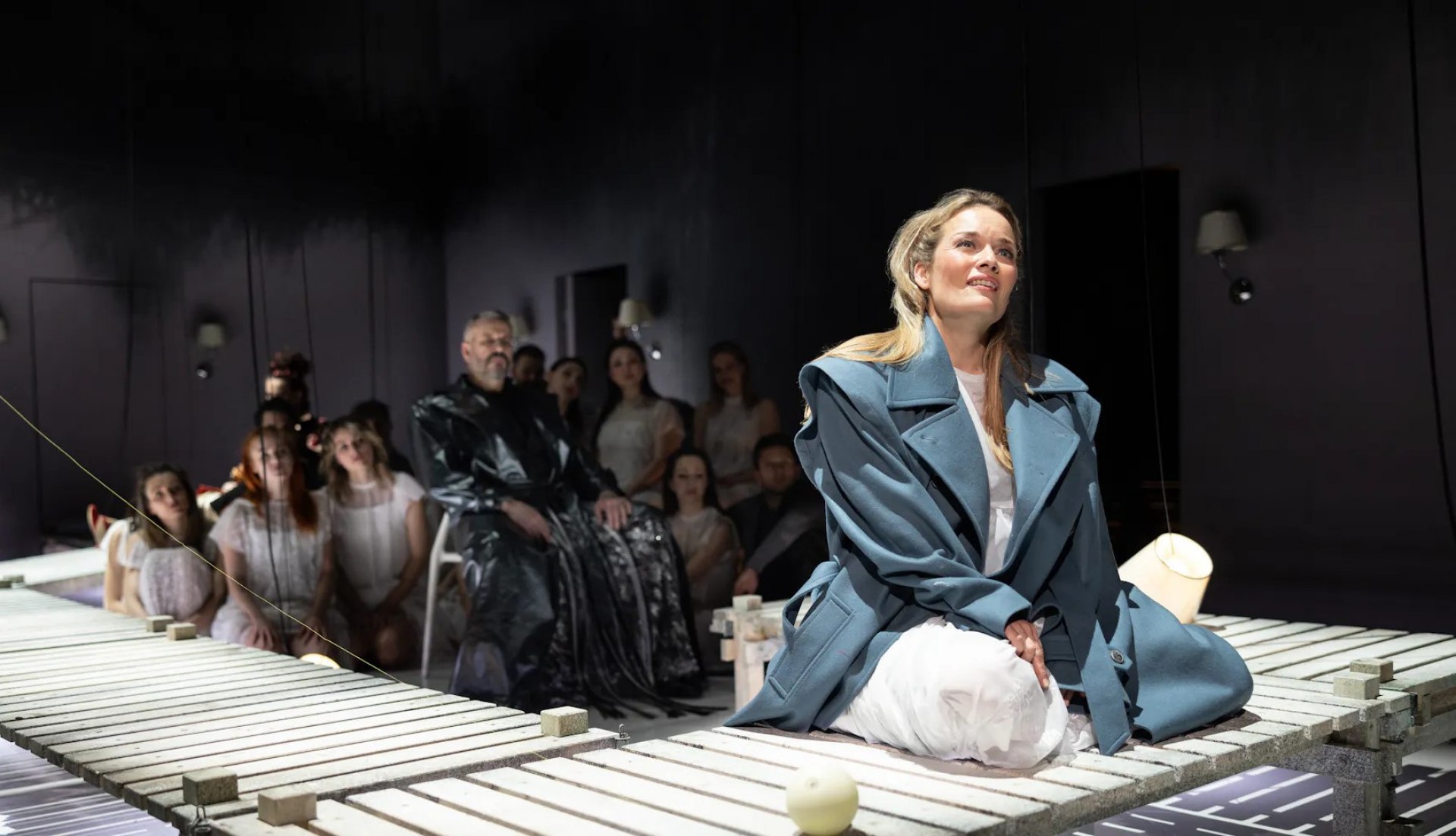
 Seating plan
Seating plan 
